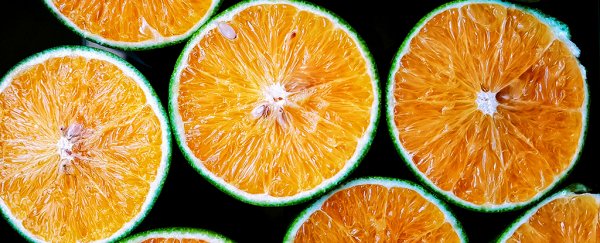Include oranges as a regular part of your diet, and your chances of developing macular degeneration – a particularly nasty form of sight loss – could be reduced by as much as 60 percent, according to a new study spanning 15 years.
The data collected by the researchers suggests that the health boost is caused by flavonoids in the fruit, chemicals that give fruits and vegetables their distinctive colours and which can also act as powerful antioxidants.
(Interesting side note about the image above, oranges can actually have green skin depending on where they were grown.)
These flavonoids have been linked to anti-inflammatory boosts for the immune system for a number of years, but this is the first time they've been analysed in connection with this eye disease, which affects millions of people over the age of 50.
According to the researchers behind the study, if you want an easy and healthy preventative medicine, this might well be it.
"Essentially we found that people who eat at least one serve of orange every day have a reduced risk of developing macular degeneration compared with people who never eat oranges," says one of the team, epidemiologist Bamini Gopinath from the University of Sydney in Australia.
"Even eating an orange once a week seems to offer significant benefits."
The researchers looked at data from the Blue Mountains Eye Study, a population-based study in Australia that got underway in 1992. They picked out 2,037 individuals aged 50 and above who were asked about their dietary habits, with a follow up analysis added a decade and a half later.
Those who reported eating oranges regularly were significantly less likely to have developed macular degeneration over that 15 year timespan, and it seems as though the flavonoids in oranges were the key.
"We examined common foods that contain flavonoids such as tea, apples, red wine and oranges," says Gopinath.
"Significantly, the data did not show a relationship between other food sources protecting the eyes against the disease."
The macula is part of the retina in the eye, and handles everything to do with central vision. As macular degeneration develops, those with the condition become unable to see what's right in front of them – while it doesn't cause total blindness, it can make life much harder.
The exact cause of macular degeneration isn't known, but it's usually linked to age. In most cases, signs of the condition appear when people are in their 50s and 60s.
How widespread the condition is depends on the country, but millions of people are affected in the US alone, while in Australia, 1 in 7 of the over-50s have some kind of macular degeneration. Those numbers are going up too
As yet there's no cure, but perhaps oranges will one day form the basis of a preventative treatment. While the new study doesn't prove that oranges can ward off macular degeneration, the long timespan and reasonably large sample between fruit and eye condition mean the link is a relatively strong one.
Now further research will be required to get to the root causes of macular degeneration – the biological and non-biological factors that cause our eyes to fail in this specific and damaging way.
"Our research aims to understand why eye diseases occur, as well as the genetic and environmental conditions that may threaten vision," says Gopinath.
The research has been published in the American Journal of Clinical Nutrition.
